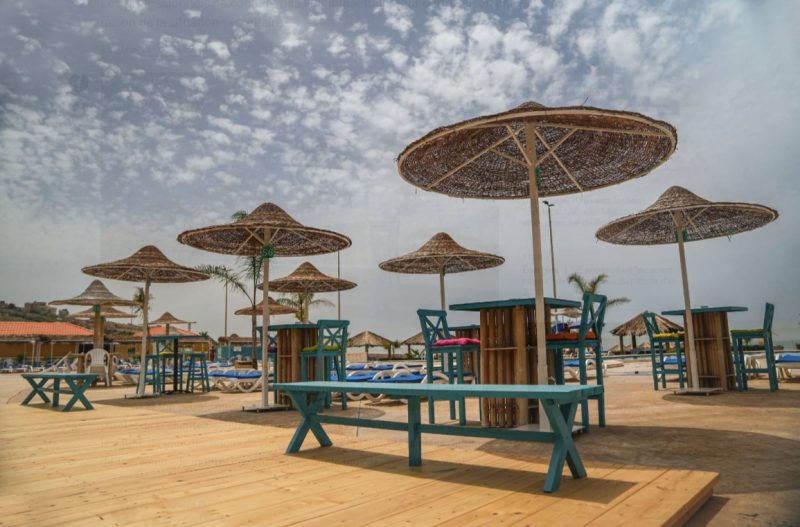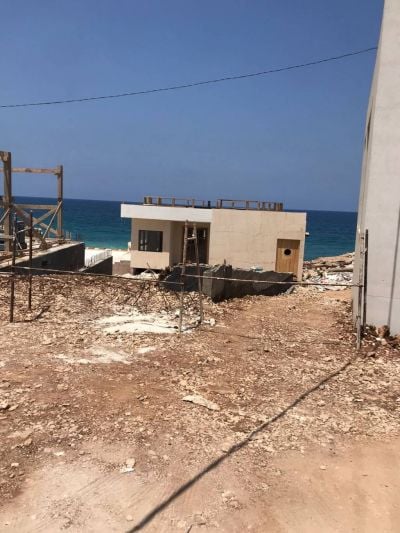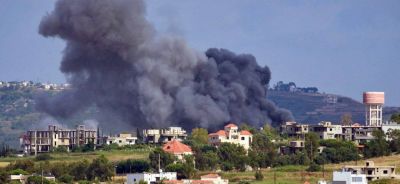
A seaside resort in Damour, Chouf, in May 2024. (Credit: Mohammad Yassine/L'Orient Today)
"Tell them we're going to stay. We refuse to die,” Julia Boutros sings. “Your land, your homes and your suffering people are ours, dear South."
On June 2, as Israeli warplanes flew over Sour public beach, breaking the sound barrier and causing loud booms, it was this song that the dozens of beach-goers sang along to in defiance, as shown in a video shared widely online.
Some might see the cheering and singing as denial, while others might see resilience in the face of eight months of cross-border fighting along the southern Lebanese border between Hezbollah and Israel.
The owners of beach resorts are worried, but bathers are not discouraged. They flock to Lebanese beaches despite the daily Israeli attacks in the south, and a steep hike in entrance fees to beaches this summer.
Set in dollars, prices this year range from $5 to $60, compared with $3 to $40 in 2023.
According to Jean Beiruti, president of the Beach and Spa Owner’s Union, prices have risen "slightly" this summer. He justified the increase by pointing to rising electricity bills and salaries, as well as the rent for leasing part of the coastline from the State, which is also now paid fully in fresh dollars. Last year, only part of the rental fee was charged in foreign currency, the union president explained.
Beiruti claimed the rates for accessing private beach resorts, which cover at least 80 percent of Lebanon’s 220 kilometers of shoreline, don't exceed $35, the exception being those offering a more luxurious service, while Naji Morkos, founder and managing director of the consulting firm Hodema said it’s only the “popular resorts” that have raised their entrance fees this year.
Varying prices by region
In Beirut, prices sometimes reach $60, as in the five-star Phoenicia and Kempinski hotels. Other resorts offer lower rates, such as Coral Beach ($30), Saint-Georges ($35) and Sporting Club ($40). Some resorts in the capital have varying prices. At Lancaster Eden Bay, for example, women are charged an $35 entrance fee, compared to the $50 entrance fee for men. The hotel charges $60 for couples.
In Kesrwan, prices range from $12, as at the Lamedina Hotel, to $30 (on weekends and public holidays), as at the Automobile et Touring Club du Liban (ATCL) in Kaslik.
In Jbeil, entrance fees range from five dollars at the C Flow Resort to 35 dollars at the Eddé Sands. These figures are similar to those for the beaches of northern Lebanon, where prices range from seven dollars, as at Salacia Beach (Enfé), to 40 dollars, at Butlers Beach Club (Batroun), for example.
In the Chouf, resorts charge between $10 (Rmeilé Resort) and $30 (Lazy B Beach, Jiyyeh).
Concern in the south
In southern Lebanon, some resorts offer free beach access, such as Hayek Beach Resort in Sour. Others claim not to charge admission, but impose a minimum consumption of $15 (Cloud 59, Sour), while some resorts charge $20 (Rest House, also Sour).
"We've been welcoming bathers since May, especially on the weekends,” said one beach resort owner, speaking on condition of anonymity. “They enjoy their day without being worried by the bombardments they hear from time to time.
“We sometimes hear planes breaking the sound barrier, as is the case for the inhabitants of Beirut,” another owner from southern Lebanon said. “But, we know that nothing is going to happen nearby.”
While some resorts continue to operate despite the ongoing conflict, others, closer to the Lebanese-Israeli border, are more affected.
"We don't know if we'll be able to open our doors this summer," said one of the managers at the Rêve de la Mer resort in Naqoura, a border town repeatedly targeted by Israeli strikes.
Beiruti is also worried. “Last year, the hotel occupancy rate in May was 70 percent, compared with just 20 percent this year," he said.
Pierre Achkar, president of the Lebanese hoteliers' union, declined to comment on the subject for the time being, saying he preferred to wait for a clearer sense of the security situation in the south before making predictions about the summer season.
Morkos, however, said this year was set to be “one of the worst on the horizon” for owners of beach resorts between Beirut and the southern border. "We're in the middle of a war, the security situation is unstable, and there are no advance bookings.”
According to him, there are "few positive prospects" due to the fighting in the south, where Israeli airstrikes have forced guesthouses to close their doors, notably in Sour and Naqoura.
This article was originally published in French on L'Orient-Le Jour and translated by Amelia Hankins.



